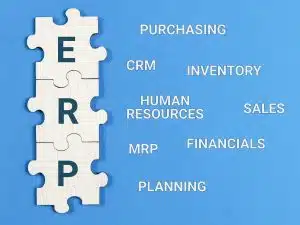What is Enterprise Resource Planning (ERP)?

What is Enterprise Resource Planning (ERP)?
Enterprise Resource Planning (ERP) is a type of software that helps organizations manage and integrate various business processes. such as finance, human resources, and operations. in this page , We will explore the concept of resource management in Enterprise Resource Planning. and provide examples of common Enterprise Resource Planning systems, and discuss the components, benefits, features, and challenges of this powerful tool. We will also examine the key applications and trends in Enterprise Resource Planning (ERP), And address some common misconceptions about this technology.
What is resource management in ERP?
Resource management in ERP refers to the way an organization allocates and uses its resources to achieve its goals. Thus, by integrating all the business processes of the organization into one system, ERP also helps reduce the time and effort required to manage and analyze data. It allows better decisions to be made. This in turn leads to improved efficiency and productivity.
Examples of ERP:
One example of an ERP system is SAP , It is a popular choice for large organizations in a variety of industries. Other examples include Oracle and Odoo . These systems also offer modules for financial management, supply chain management, human resources, and manufacturing, among others, and can be customized to fit the specific needs of an organization.
What are the components of an ERP system?
The components of an ERP system typically include modules for financial management, supply chain management, human resources, and manufacturing. These units work together to provide a comprehensive view of the organization and its operations, Allowing for better decision making and resource management.
Where is ERP mostly used?
ERP systems are commonly used in manufacturing, retail, and service industries, As well as in the public sector. It can be especially useful for organizations with complex operations and multiple locations, Because it helps in simplifying processes and eliminating inefficiencies.
What is the main benefit of ERP?
The main benefit of ERP is improved efficiency. By integrating all business processes of an organization into one system, ERP helps reduce the time and effort needed to manage and analyze data, It allows better decisions to be made. Other benefits include increased productivity, improved customer service, and reduced costs.
What are some characteristics of enterprise resource planning (ERP) systems?
Some characteristics of ERP systems include the ability to handle large amounts of data, real-time reporting, and integration with other systems. They often come with customization options to fit the specific needs of the organization.
What are the challenges of implementing an ERP system?
There are many challenges facing the implementation of an ERP system, Including high costs, The time and effort required for preparation and training, and the potential for disruptions to business operations during the transition. It is important for organizations to carefully evaluate their needs and resources before committing to an ERP system.
Who uses ERP in the company?
In the company , Enterprise Resource Planning (ERP) systems are typically used by management, finance, and operations teams, In addition to other departments that require access to data and business processes.
What are the main applications of ERP?
Major applications of ERP include financial management, supply chain management, human resources, and manufacturing. By simplifying these processes, Accordingly, ERP helps organizations operate more efficiently and effectively.
Who benefits from ERP?
Anyone in an organization can benefit from ERP, Because it helps improve efficiency and decision-making in all areas. This includes employees, who may see increased productivity and improved tools and resources, And customers, who may experience improved service and response.
What are the major trends in ERP?
In the last years , There have been several major trends in ERP, Including the move to cloud-based systems, and integration of artificial intelligence and machine learning, and the growing importance of mobile accessibility. These trends reflect the increasing importance of technology in business and the need for organizations to stay current and competitive.
What are some misconceptions about ERP?
There are a number of misconceptions about ERP, Such as thinking that it is only for large organizations or that it is very expensive and complex to implement. However , Through careful planning and comprehensive understanding of the organization’s needs, ERP can be a valuable tool for businesses of all sizes.
in the endEnterprise Resource Planning (ERP) is a powerful tool that can help organizations manage and integrate different business processes, improve efficiency, and increase productivity. While there are challenges to implementing an ERP system, the benefits and potential for improving performance make it a valuable consideration for any organization. By keeping up with trends and carefully assessing their needs, businesses of all sizes can effectively leverage ERP to achieve their goals.
